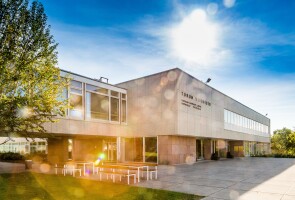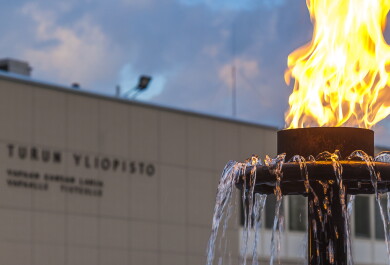The Finnish Research Infrastructure Committee at the Research Council of Finland has decided on more than 29 million euros in funding for the building and upgrading of national and international research infrastructures. The University of Turku is involved in five of the funded research infrastructures.
The Research Council of Finland has granted a total of 29 million euros in funding for 11 research infrastructure projects. The University of Turku is involved in five of the funded research infrastructures.
This is the first set of decisions on the FIRI 2023 call for research infrastructure applications. The funding will strengthen biobanking services for research and innovation as well as platforms and a national network of services for life sciences and biomedicine technology. Funding was also awarded for the development of microscopy methods and equipment for bioimaging and for the exploitation of data and technologies in social sciences and humanities.
The funded projects will also promote the integration of quantum computing with high-performance computing and research into natural and synthetic inorganic materials. The funding will also support research to address and study the challenges of biodiversity loss, climate change, air quality and pollution, as well as the analysis of molecules and materials to promote research on the green transition and lifelong health. In addition to the above, funding was also granted for investments in equipment and methods for structural biology research and for research into new phenomena in particle physics.
The Finnish Research Infrastructure Committee is set to make more funding decisions on 31 January 2024 based on the 2023 research infrastructure call.
More than 1.9 million for research infrastructures at the University of Turku
The University of Turku is involved in five funded research infrastructures. In these, funding has been allocated to strengthen and develop the existing research infrastructures.
The University of Turku is involved in the following infrastructure projects that have received funding:
Biocenter Finland: Critical Investments in National Life Science Research Infrastructures (Biocenter Finland), 721 000 € (Director Klaus Elenius, BioCity Turku)
Euro-BioImaging Finland: Finnish Advanced Microscopy Node (Euro-BioImaging Finland: FiAM), 882 000 € (Research Manager Pasi Kankaanpää, Research Manager Tiina Saanijoki, Head of Faculty Development Eeva Rainio)
FIN-CLARIAH – Developing a Common RI for CLARIAH Finland (CLARIAH), 127 364 € (Professor Veronika Laippala)
Finnish Marine Research Infrastructure (FinMaRI), 98 000 € (Station Manager Jari Hänninen, Archipelago Research Institute)
Integrated Atmospheric and Earth System Research Infrastructure: Integrated observations for effective climate solutions in terrestrial ecosystems (INAR RI), 100 000 € (Station Manager Otso Suominen, Kevo Subarctic Research Institute)
Biocenter Finland: Critical Investments in National Life Science Research Infrastructures (Biocenter Finland)
University of Helsinki, University of Eastern Finland, University of Oulu, Tampere University, University of Turku, Åbo Akademi University
Biocenter Finland (BF) is a nationwide Life Science research infrastructure organization owned by six Finnish universities. BF coordinates 15 technology platforms comprising of 70 core facility units covering key technologies in Life Sciences, and provides open access services to 17,000 academic, healthcare, and industry researchers across Finland. BF is widely considered an exemplar in coordination and strategic use of financial and human resources within a discipline.
BF is applying for critical equipment and digital updates in six platforms to continue providing high-quality services for cutting-edge research in Life Sciences. These platforms cover areas in genomics, proteomics & metabolomics, bioimaging, digital pathology and gene transfer & cell therapy. These instruments are critical investments for the current research infrastructures to support the nation-wide network of services and provide access to cutting-edge technologies for innovative research.
Euro-BioImaging Finland: Finnish Advanced Microscopy Node (Euro-BioImaging Finland: FiAM)
Åbo Akademi University, University of Helsinki, University of Oulu, University of Turku
Bioimaging with advanced microscopes is one of the most used research methods in life sciences, needed by almost all researchers studying for instance cancer medicine, viruses or the immune system. In Finland, critical services in bioimaging are provided by the Finnish Advanced Microscopy Node (FiAM), operating in Turku, Helsinki and Oulu.
FiAM is led by Turku BioImaging, and it is the most popular service unit of the large European landmark infrastructure Euro-BioImaging.
FiAM’s services are very important also for numerous Finnish health and drug development companies. In the 3DBioImage project, FiAM will establish an extensive set of the newest microscopy methods, capable of high-resolution 3D imaging also from living samples. FiAM will also establish 3D image analysis services based on artificial intelligence, and a remote access model for the green transition.
All the new services are critically needed by FiAM’s users and significantly broaden the Node’s societal impact
FIN-CLARIAH – Developing a Common RI for CLARIAH Finland (CLARIAH)
Aalto University, CSC – IT Centre for Science Ltd., Tampere University, University of Eastern Finland, University of Helsinki, University of Jyväskylä, University of Oulu, University of Turku
FIN-CLARIAH is a research infrastructure for Social Sciences and Humanities (SSH) comprising two components, FIN-CLARIN and DARIAH-FI. In the current project, FINCLARIAH seeks to significantly upgrade the SSH infrastructural support in four directions:
1) to enable the processing of spoken minority language data,
2) to provide tools for a broad range of SSH research processing unstructured text,
3) to facilitate research in audio-visual culture by processing metadata,
4) to support transformer technology uptake among SSH researchers.
While FIN-CLARIN continues to break new ground in supporting research based on language data, DARIAH-FI will develop infrastructure for big, heterogeneous datasets for research in the humanities and social sciences. An important additional aim of the current project is to develop a best common practice for the management of access to copyrighted data for research verification according to the text and data mining directive.
Finnish Marine Research Infrastructure (FinMaRI)
Geological Survey of Finland, Finnish Environment Institute, Finnish Meteorological Institute, Natural Resources Institute Finland, University of Helsinki, University of Turku, Åbo Akademi University
The Finnish Marine Research Infrastructure (FINMARI) combines all major partners (Syke, FMI, GTK, Luke, Universities of Helsinki, Turku and Åbo Akademi) of the Finnish marine research community. It is a distributed infrastructure network of field stations, research vessels, laboratory facilities, ferryboxes, autonomous measurement platforms and buoys.
FINMARI provides access to observational and experimental marine research facilities. Our joint infrastructure development plan is based on addressing the multiscale variability of the marine environment by integrating the complementary areas of expertise of each partner. FIRI2023 project aims at filling the remaining gaps in the present research infrastructure as well as maturing digitalization and Open Access to data and services.
FINMARI will concentrate on global Triple Crisis: biodiversity loss, climate change and pollution and will act as a link between science and policy makers.
Integrated Atmospheric and Earth System Research Infrastructure: Integrated observations for effective climate solutions in terrestrial ecosystems (INAR RI)
CSC – IT Centre for Science Ltd., Finnish Environment Institute, Finnish Meteorological Institute, Natural Resources Institute Finland, Tampere University, University of Eastern Finland, University of Helsinki, University of Oulu, University of Turku
INAR RI is an umbrella RI, coordinating the distributed national nodes of European environmental research infrastructures (ICOS, ACTRIS, eLTER and AnaEE).
INAR RI is benchmarking in the integration of multidisciplinary comprehensive environmental measurements with 30 stations, several laboratories and mobile units and two data infrastructures. This project shall upgrade the existing RI with a focus on the urban and agricultural environments and develop services to help the society to answer questions related to air quality and climate change.
This project strongly supports the national goal of carbon neutrality by providing missing information regarding urban and agricultural emissions allowing us to assess the full air quality and climate impacts and feedbacks related to agricultural activities and urban greenery.




